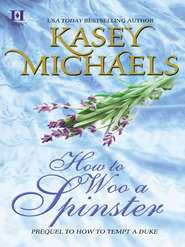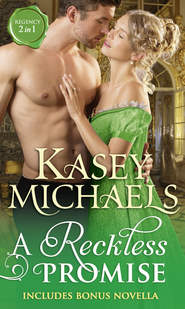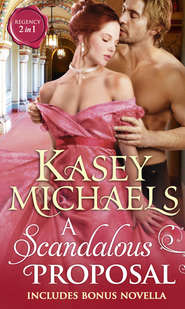По всем вопросам обращайтесь на: info@litportal.ru
(©) 2003-2025.
✖
Shall We Dance?
Автор
Год написания книги
2018
Настройки чтения
Размер шрифта
Высота строк
Поля
The footman went through a complicated choreography of tilted head, shrugged shoulders and broadly waved hands. “These Englishers,” he said sadly. “Our poor queen. They try…they…fare polpette di qualcuno.”
Amelia quietly translated, and then smiled, for Gerado had said that the English were trying to make meat-balls out of the queen. “In England, Gerado, that would be mincemeat, but I agree with you. Still, we are here, and we have no real choice but to stay the course.”
“Scusi?”
Amelia also shrugged, though never so eloquently as the footman. “Quando si è in ballo, bisogna ballare, Gerado.”
“Ah!” Gerado said, then made another complicated and, Amelia was certain, disparaging movement of his hands meant to encompass all of London, all of England, before he smiled. “For our queen,” he said, and then saluted.
“Yes, Gerado. For our queen. And, for our queen, since Carstairs has fled, I would ask you to attend the door, if we have visitors. Thank you. You may go.”
The footman bowed and retreated, muttering under his breath.
Amelia just sat there, her elbow on the table, her chin cupped in her palm, her words to Gerado playing again in her head. Quando si è in ballo, bisogna ballare.
When at a dance, one must dance. It was her favorite Italian saying, as it described, she believed, her own life. She was here, for good or ill, as the housemaid’s orphan turned companion to a reviled queen; the buffer, the guardian, the protector. Whatever. She was here, whatever her role, and she would dance.
“And hopefully without our toes being stepped on too much,” she said, then looked out over the Thames, wishing she were looking at Lake Como instead, and saw the boats. So many boats, of every shape and size, all of them passing back and forth slowly in front of the building, while those in the boats stood and pointed and stared. Ruder contraptions bobbed on the water, filled with hawkers holding up meat pies and parasols and spy glasses, the better to see the queen.
The queen would see them, too. There was no escape from what had been set in motion, not with the king’s death, but from the very first time Caroline of Brunswick had first set food on English soil.
Amelia stood, crossed to the window and determinedly drew the draperies shut, wondering if she could make the queen believe that those in the boats had all come to salute her…not just to gape at a new oddity in their midst.
PERRY SHEPHERD had not so much as lifted his hand to the knocker before the door to his uncle’s household was opened by a liveried footman and he was ushered through to the great man’s private study by an entirely too-amused Hawkins.
“You’re late, Nevvie,” Sir Willard barked from the couch, where he sprawled against the protesting leather, his left leg raised onto the seat and wrapped in at least ten yards of white cotton cloth.
“Gout again, Uncle? My sympathies,” Perry said as he ignored the uncomfortable chairs in front of the desk and deliberately seated himself behind the desk, in Sir Willard’s chair.
“Get out of there, you insolent puppy,” his uncle ordered, but Perry stayed put. “Oh, very well, stay there. But don’t touch anything.”
“Like this?” Perry asked, fingering a letter opener with the head of some fantastical animal carved onto the hilt. “Or perhaps this?” he asked, picking up the top sheet from a pile of papers stacked on the blotter. “‘My dear man,’” he quoted, “‘how good to hear that you have corralled your nephew for the mission, although I reserve final approval of your judgment until we have word of his success. He is not averse to poking in laundry hampers, I should hope?’” Perry put down the page. “Not signed. Who the devil wrote this? Liverpool himself? My, my, am I supposed to be impressed? Or insulted? Let’s see, what else is here?”
“Put that down! Put it all down! You’re to spy on Princess Caroline, not me.”
“Queen Caroline, Her Royal Majesty, et cetera, et cetera,” Perry said. “You really should try to get that right, Uncle Willie.”
“Don’t call me Uncle Willie. And shut up.” Sir Willard struggled to sit up, holding on to one beefy thigh with both hands as he aimed his aching foot toward a small footstool. “Show some respect for your elders, will you?”
“Of course, Uncle. Forgive me. I suppose it has something to do with that whacking great lump at the bottom of your leg. Perhaps if you were to shift your mourning band to it? Give the thing a touch of dash? Just a suggestion, you understand. I’m not really amusing myself. Truly.”
His uncle glared at him. “You’ve decided not to take any of this at all seriously, haven’t you? You’re here, but you’re letting me know that you are here under duress, and you’re going to make the entire exercise as difficult on me as you can. Correct?”
“Mostly,” Perry said, stroking his cravat. “You forgot that I’m also going to make broad, rather vulgar jokes at any opportunity. I won’t be able to help myself.”
“Yes, I know, which is why I brought you back here today.” Sir Willard reached for the cane propped against the couch and banged it hard against the wall, twice.
Perry was just about to give in and ask what the devil his uncle was up to when the door opened yet again and in walked…well, what was it, precisely?
“I harkened yer signal, guv’nor,” the man (definitely a man, or else one horribly shortchanged woman) said, pulling at his forelock before hooking a thumb in Perry’s direction. “This be him?”
“This be Perry Shepherd, Earl of Brentwood, in point of fact,” Perry said, bowing slightly even as he remained seated. “And who, pray tell, my good man, be you?”
“Don’t be facetious,” Sir Willard ordered crisply. “This is Clive Rambert. He’s a Bow Street Runner I’ve hired to accompany you at all times.”
Perry smiled, then chuckled, deep in his throat. “Oh, I don’t think so, Uncle. I really, really don’t think so.”
“Strange. I don’t remember asking your approval of the arrangement. Rambert here is the best, or so I’m told. Sniffer like a hound. He’ll keep you to the straight and narrow, and watch your back while he’s at it. Won’t you, Rambert?”
“Right yer are, guv’nor,” Clive said, winking at Perry. “Pretty bloke, ain’t yer?”
Perry closed his eyes, pulled at his nose. “I watch my own back, Uncle, thank you,” he said quietly, reining in his temper.
“Not this time, my boy,” Sir Willard told him. “You watch the queen, Rambert here watches you and reports to me. You seem to have this failing, Nevvie. From time to time you conveniently forget I’m alive.”
“Reading my mind again, Uncle?” Perry said, easing himself to his feet. “And now, if you’ll excuse me, I’ll be on my way. Alone.”
Sir Willard struggled to sit up further. “Listen to me, Perry. Rambert here is an eyesore, I grant you—”
“Aw, guv’nor, that hurt, that did,” Clive said, not looking in the least insulted.
“Don’t interrupt your betters,” Sir Willard barked, and Clive subsided into a subservient pose that carried with it more than a hint of suppressed insolence that said better than words that here was a fellow who’d lived by his wits for a long, long time. A man who, to Perry’s mind, was a born sergeant. He’d always had a certain fondness for sergeants, as they did what they were told by their commanding officers, unless they could find a way to do it as it pleased them—meaning, without getting everyone in his charge bloody killed.
“As I was saying—”
“Never mind, Uncle,” Perry said, holding up one hand. “I’ll take him.”
“You’ll…?”
“I said, I’ll take him. I even think I might like him.” Perry turned to Clive. “You like me, Rambert?”
“I’m gettin’ used to yer,” the Runner answered cheekily. “Ain’t half so thick as the guv’nor here thinks, are yer?”
“Not even a quarter so thick, Sergeant,” Perry assured him. “Where did you serve?”
Clive sprang to attention, snapping his ankles together, which were the only place the man’s bandy legs touched each other. “The Peninsula, sir.”
“Ouch. Those were some bad times.”
“And some pretty señoritas, sir, if yer take m’meanin’.”
Sir Willard subsided against the arm of the couch. “God, what have I done. Two minutes, Nevvie, less than two minutes. And you’ve corrupted the man.”
“Oh, Uncle, someone got there long before me. I’ll just reap the benefits. Come along, Clive. There’s someone I’d like you to meet.”
“Where are you taking him? Who is he going to meet?”
“A tailor, Uncle. Or did you really think Clive here would fool anyone in that red-robin waistcoat?”











